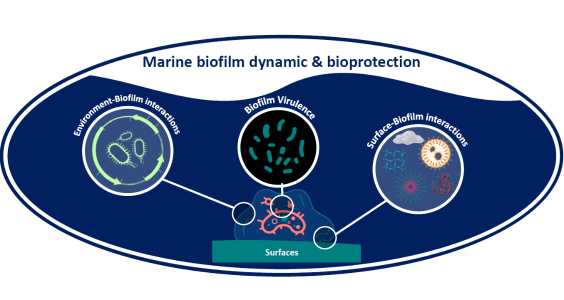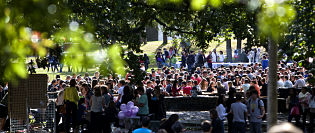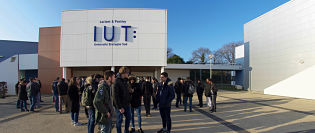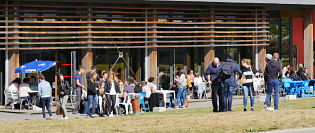Laboratory Presentation and networks
Laboratory Presentation and networks
The laboratory’s integrative approach to its research into biofilm dynamics
The laboratory is taking an integrative approach to its research into biofilm dynamics, with the aim being to control these dynamics via:
-
The development of antibiofilm surfaces
-
And/or the development of biological control (marine micro- or macro-organisms)
-
And/or the use of original bioactive compounds extracted by means of novel processes.

Our research staff boast a multidisciplinary skill set encompassing chemistry, biochemistry, molecular biology, microbiology, cellular biology, biology of organisms and physiology. This allows us to adopt complementary approaches to what we do, making LBCM a modern scientific laboratory.
Three key scientific questions emerge from this area of R&D:
- What is the link between surface heterogeneity and the interactions between the surface and microbial cells when biofilm is formed?
- How does chemical mediation work within holobionts and bioprotection?
- What is the link between biofilm and bacterial virulence?
By taking a global approach to biotechnology value creation using data from these three questions, we can transfer the technologies to businesses and to society at large.
Value creation in the laboratory
A characteristic expression of laboratory-based value creation is the eco-friendly development of antibiofilm/antifouling surfaces with the aim of creating new antifouling paint formulations. One such example is the Lab-Com SAFER joint laboratory initiative involving Nautix and LBCM, with the backing of the French National Research Agency, ANR. Other projects are relevant in this respect too. They include the development of probiotics in aquaculture, supported by SATT Ouest Valorisation and companies like Marine Akwa and Satmar, the recovery of algal biomass in collaboration with Armen Instrument and Newonat, Agrival, OLMIX and Roullier, and lastly, the investigation of antibiofilm essential oils in conjunction with BIOARMOR.
LBCM forms part of two of the University’s ecosystems:

Sea and Coastline: innovation zones, land use and transition
This ecosystem was designed to coordinate scientific and educational initiatives, raise the national and international profile of work on maritime issues, provide a better response to requests from its users and partners, and expand ties with business. As a result of this strong signposting, we were able to join France’s national network of Marine Universities, which provides transparency in terms of both the courses we offer, as listed on the Marine Universities website, and our scientific activities. LBCM’s main involvement in this ecosystem is in the Port of the Future project.

Health, environment and disability
This ecosystem is directly linked to our biotechnology-related activities. In response to strong societal demands relating to the environmental and ecological transitions, efforts are being focused on developing more natural approaches such as
-
Ensuring that agricultural and aquaculture production is sustainable, while maintaining food quality and safety
-
Testing new therapeutic solutions in human and animal health
-
Providing solutions to issues of environmental pollution
-
Introducing a bioinspired approach that will support the region’s businesses in their engineering-based design or eco-innovation processes.
This approach also consolidates the momentum associated with Carnot Agrifood Transition, the partnerships with technical centres and businesses and lastly, CPER BIOALTERNATIVES.

A laboratory with ties to the European Institute for Marine Studies (IUEM)
LBCM has continued to strengthen its ties with the European Institute for Marine Studies, with a change in its status from partner laboratory to IUEM laboratory. It is also one of the three laboratories leading the new thematic focus on “Marine biotechnology” at IUEM. LBCM’s participation in projects with the ANR “Investing for the Future” label—“LabexMER”, “IDEALG” (2010-2020) and now EUR ISBlue—consolidates this approach.
Website: https://www-iuem.univ-brest.fr/

LBCM has been a building block of the Carnot AgriFood Transition Institute since 2016
Along with 14 other partners (academic research units and technical centres), LBCM is responding to the scientific and technological challenges posed by industry’s emerging needs for R&D in sustainable food, human health and the health of the environment.
AgriFood Transition is developing various types of partnerships to work with businesses:
-
Advice and expertise
-
Technical delivery platforms
-
Contract R&D arrangements between laboratories and businesses
-
Subsidised collaborative projects, both national and international
-
Establishment of joint laboratories
-
CIFRE (Industrial Agreements for Training through Research) doctoral theses
AgriFood Transition was set up under the leadership of ACT Food Bretagne, with support from the Regional Council of Brittany. At the end of 2016, it received the Institut Carnot label from France’s Ministry of Higher Education and Research, joining a national network of 38 Institut Carnot-labelled entities which undertake more than 50% of the R&D funded by French public research bodies.
For more information, see www.agrifood-transition.fr









